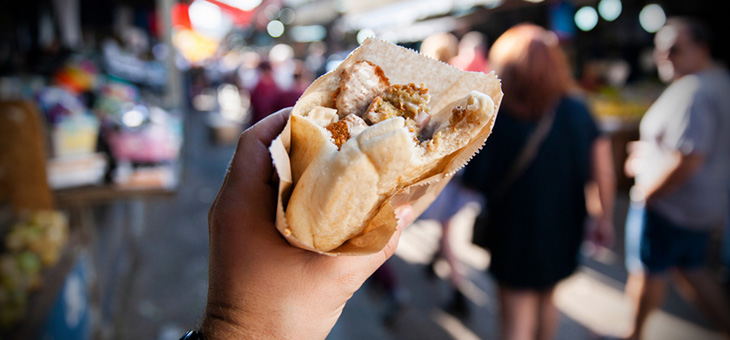Food poisoning is one of every traveller’s worst fears. Not only are you wiped out physically – I won’t delve into the unsavoury details – but you miss out on a day of adventures. These are some foods you may not have realised can cause food poisoning, and you may want to steer clear of while abroad.
Burgers
Bacteria can double over a 20-minute period at room temperature, and the risk for meat grows with increased surface area. Burger patties are made from mince, meaning that bacteria and pathogens can easily get caught up in the middle of the patty and avoid being killed if the meat is not cooked all the way through at a high enough temperature. Either avoid eating burgers or, if you can’t resist, inspect the patty to make sure it is brown all the way through, although even this won’t guarantee your safety.
Rice
Cooked rice is moist and has a high surface area, making it the perfect petri dish for bacteria such as Bacillus cereus. Rice rarely lasts more than a day, even refrigerated, before bacteria start to grow, so make sure the rice you eat was cooked recently and reheated at a high temperature.
Tuna
Tuna is particularly prone to scombroid poisoning, a type of toxicity that develops when fish is not stored properly. While this type of food poisoning will have you running to the bathroom, it may also cause sweating and a rash to break out on your upper body and face. You won’t be able to detect this toxicity by smell, and instead may notice a peppery or burnt taste. It is also common in …
Red kidney beans
If red kidney beans aren’t heated up enough during the cooking process, a protein called lectin won’t be destroyed. Lectin can cause vomiting and diarrhoea. Kidney beans cooked in a slow cooker will still be dangerous as the temperature won’t get high enough to destroy lectin. Make sure your beans are cooked for at least half an hour in boiling water to ensure their safety.
Sprouts
Uncooked sprouts are high-risk. This includes bean shoots, alfalfa, mung bean, sunflower and clover sprouts. Sprouts require a warm and moist environment to sprout, which is perfect for the growth of bacteria, so it’s best to avoid any uncooked sprout.
Sunny-side-up eggs
While sunny-side-up eggs may be a delicious breakfast classic, they may also land you with a salmonella infection. Children, seniors and those with compromised immune systems should opt for well done or hard-boiled eggs to ensure that bacteria are killed off during the cooking process.
Leafy greens
According to Reader’s Digest, fresh produce was responsible for 48 per cent of food-based illnesses between 1998 and 2008. When travelling, it can be hard to know the source of the food you’re eating and whether or not your greens have been washed properly before being served. Try to eat only leafy greens from a reputable restaurant, or inspect the leaves before you dig in. Even a little dirt may indicate your salad leaves weren’t washed and may be a food poisoning disaster waiting to happen.
Melons
If you buy a watermelon as a summery treat, consider washing the outer skin before cutting into it. We often don’t consider the bacteria and dirt that collects on the outer skin of these fruits, because we don’t eat those parts, but your knife can pick up bacteria as you cut up the fruit and move it to the fleshy area.
Pastries and pies
Who doesn’t want to go on a European pastry crawl? However, if you expect these treats to be risk free you may have bitten off more than you can chew. Bacteria called staphylococcus are found on around a quarter of people’s hands. The risk with pastries, especially crème-filled pastries, is that many of them are made by hand and not cooked again, meaning they may carry bacteria from their maker’s hands. Don’t worry, you don’t need to abandon crème treats all together, just make sure you purchase them from a reputable place.
Unpasteurised dairy
In most Western countries, pasteurisation, the process of heating up milk to kill dangerous micro-organisms, is standard practice. Unpasteurised milk is 150 times more likely to cause food poisoning than pasteurised milk. However, it is not a requirement in many countries, so check to make sure any dairy your purchase has been pasteurised before consuming it.
If you enjoy our content, don’t keep it to yourself. Share our free eNews with your friends and encourage them to sign up.
Related articles:
How to avoid food poisoning
A story not for the squeamish
Delhi belly and Moroccan movements

